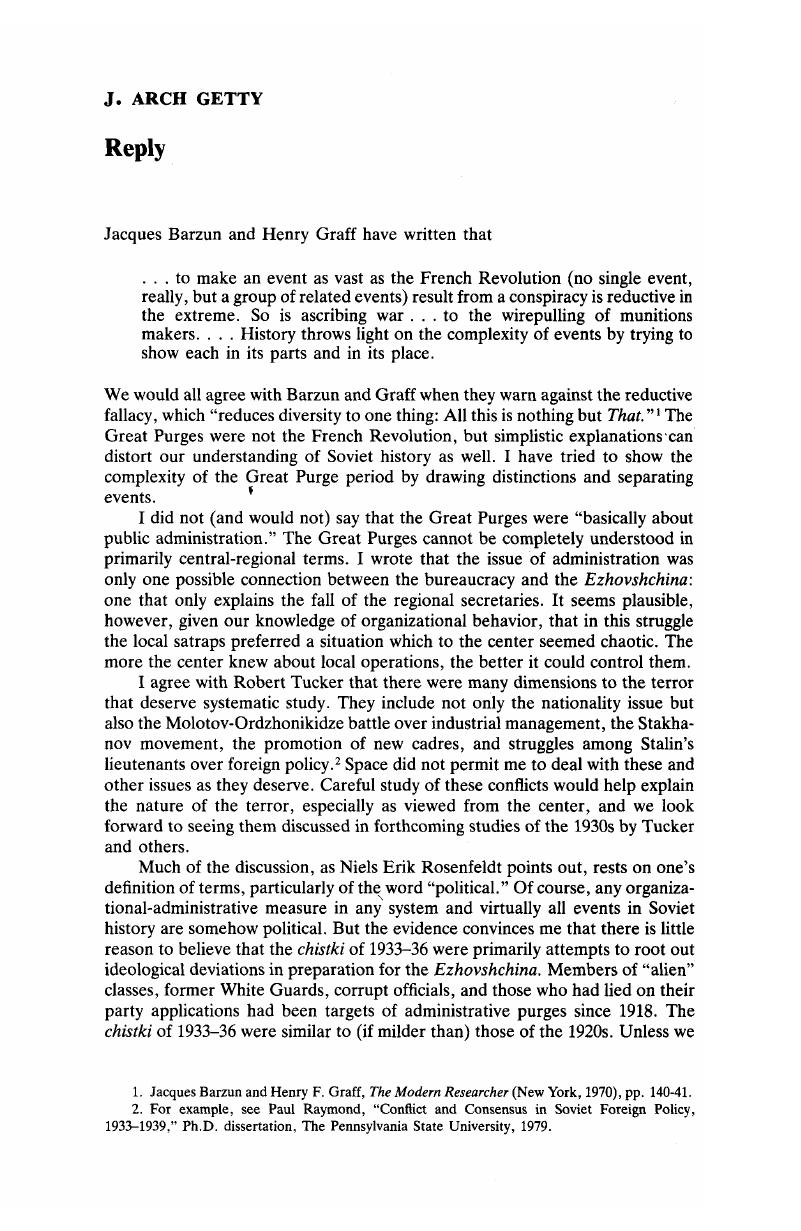
1. Jacques Barzun and Henry F. Graff, The Modem Researcher (New York, 1970), pp. 140-41.
2. For example, see Paul Raymond, “Conflict and Consensus in Soviet Foreign Policy, 1933-1939,” Ph.D. dissertation, The Pennsylvania State University, 1979.
3. The Central Committee's complaints about the verification in Smolensk in July 1935 are instructive here. See the documents in my notes 52, 56, and 57, above.
4. One can find many examples of central indecision and confusion in the 1930s. Regarding the “Exchange of Party Documents,” compare Pravda's editorials “Bez passivnykh” (March 2, 1936) and “Pervye dni” (March 14, 1936) with their warnings against widespread expulsions of passive members (March 16, 24, 1936). By May 1936, the center was advising local leaders to educate and train passives rather than expel them (Pravda, May 3,4,1936). The center did not always speak with one voice.
5. See Partiinoe stroitel'stvo, nos. 23-24, December 1936, and no. 1, January 1937.
6. Of course, we cannot exclude the possibility that Stalin had embarked on a long-range plan to discredit his regional secretaries. In such a case, the 1936-37 chistka confirmations would appear to represent an attempt by another top leader to protect the regional secretaries by absolving them on this issue.
7. Pravda, March 24 and April 1, 1937.
8. WKP 499, pp. 322-28.
9. Stalin said that the chistka of 1933 had lasted until May 1935 (actually December 1935), and that the exchange ran until September 1936 (actually December 1936). Stalin was trying to put the best possible face on the chistki to defend them from criticism. While Stalin said that the results of the chistki were “on the whole beneficial,” Andrei Zhdanov at the same meeting drew a sharp distinction between the 1937-38 police arrests and the chistki, saying that the latter were “of little effect, and did not achieve their purposes.” XVIII s“ezd vsesoiuznoi kommunisticheskoi partii (b), 10-21 marta, 1939 g.: stenograflcheskii otchet (Moscow, 1939), pp. 28, 519.
10. Aside from Adam Ulam's argument against Stalin's complicity, neither Trotskii nor Khrushchev accused Stalin of the crime, although both had an interest in doing so. Khrushchev did accuse Stalin of personally ordering the deaths of Eikhe, Rudzutak, and others — but not Kirov. I believe that the first mention of Stalin's complicity was made by Orlov, Alexander ﹛The Secret History of Stalin's Crimes [London, 1954])Google Scholar, based on rumors he had heard during his infrequent trips to Moscow. The story was then widely repeated in the West and in the USSR, although it has never been confirmed or proved.
11. WKP384, p. 231.
12. Tucker errs, however, when he asserts that Svetlanin's Dal'nevostochnyi zagovor is a forgery. A. V. Svetlanin was the pen name of A. V. Likhachev, editor of the Emigre’ journal Posev. Likhachev was a Komsomol member, a minor oppositionist, a raikom official, a staff officer (major) in the Far Eastern Red Army (1937-38), and editor of the Soviet journal Na strazhe. After his expulsion from the party and emigration, he edited Posev, lectured at Cambridge, and contributed to Grant Hounded by the KGB, he died in 1965. See his obituary/biography in Grani, no. 61 (1966): 82-97. My thanks to Professor Grover C. Furr for information on Svetlanin/Likhachev
13. Martin Broszat, for example, has written that “Hitler practiced no direct and systematic leadership but from time to time jolted the government or the Party into action, supported one or the other initiative of Party functionaries or department heads and thwarted others, ignored them or left them to carry on without a decision.” Martin, Broszat, The Hitler State (New York, 1981), xi Google Scholar. This description sounds very much like the Stalin of Hahn, Werner's Postwar Soviet Politics: The Fall of Zhdanov and the Defeat of Moderation, 1946-1953 (Ithaca, N.Y., 1982 Google Scholar